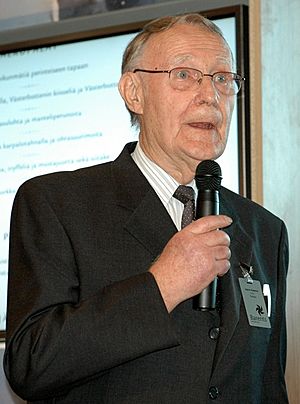Ingvar Kamprad facts for kids
Quick facts for kids
Ingvar Kamprad
|
|
|---|---|

Kamprad in Haparanda, 2010
|
|
| Born | 30 March 1926 Pjätteryd, Sweden
|
| Died | 27 January 2018 (aged 91) Älmhult, Sweden
|
| Occupation | Businessman |
| Known for | Founder of IKEA |
| Spouse(s) |
|
| Children | 4 |
| Signature | |
 |
|
Feodor Ingvar Kamprad (30 March 1926 – 27 January 2018) was a Swedish businessman. He is famous for starting IKEA, a big company that sells furniture and home goods all over the world. He lived in Switzerland for many years before moving back to Sweden.
Contents
Early Life and Family Background
Ingvar Kamprad was born in Pjätteryd, Sweden. This area is now part of Älmhult Municipality. His mother was Swedish. His father was born in Germany and moved to Sweden when he was a baby.
Ingvar's grandparents on his father's side came from Germany and Bohemia (now part of the Czech Republic). They moved to Sweden in 1896. His grandfather bought a large farm called Elmtaryd near the village of Agunnaryd. This farm was the biggest in the area. Ingvar lived on this farm with his parents, sister, and grandmother from the age of six.
How Ingvar Started His Business
Ingvar Kamprad started his first business when he was very young. He began selling matches at age five. When he was seven, he rode his bicycle to sell matches to people in nearby areas. He learned that he could buy matches cheaply in Stockholm in large amounts. Then he could sell them for a low price and still make a good profit.
From matches, he started selling other things. These included fish, Christmas tree decorations, seeds, and later pens and pencils. When Ingvar was 17, his father gave him some money as a reward for doing well in school.
Founding IKEA
In 1943, when he was 17, Ingvar used this money to start IKEA. He started the company at his uncle Ernst's kitchen table. In 1948, he added furniture to his business. Most of his sales were done through mail order.
The name IKEA is an acronym. It comes from the first letters of his name (Ingvar Kamprad). It also includes the first letters of Elmtaryd, the family farm, and Agunnaryd, the nearby village where he grew up.
Stepping Down from Leadership
In June 2013, Ingvar Kamprad decided to step down from the main board of Inter IKEA Holding SA. His youngest son, Mathias Kamprad, took his place as the chairman. Ingvar was 87 years old at the time. He said it was a good time for him to leave the board. This was part of a plan to let the next generation take over. His three sons now help guide IKEA's overall plans and future direction.
IKEA's Foundation and Wealth
IKEA is owned by a foundation called the Stichting INGKA Foundation. This foundation is based in the Netherlands. Its name, INGKA, comes from Ingvar Kamprad's name. This foundation owns INGKA Holding, which is the main company for all IKEA stores.
In 2006, The Economist magazine said this foundation was the richest charity in the world. However, the Bill & Melinda Gates Foundation has since become larger.
Ingvar Kamprad was once considered one of the wealthiest people in the world. However, he had given most of his ownership in IKEA to the Stichting INGKA Foundation. This made it hard to know his exact personal wealth.
Ingvar Kamprad's Writings
Ingvar Kamprad was a private person, but he did share some of his ideas. In 1976, he wrote a book called A Testament of a Furniture Dealer. In this book, he explained his ideas about being careful with money and keeping things simple.
He also worked with a Swedish journalist, Bertil Torekull, on another book. It was called Leading by Design: The IKEA Story. In this book, Ingvar shared more about his ideas and the challenges and successes of starting IKEA.
Past Involvement with Fascist Groups
In 1994, it became known that Ingvar Kamprad had joined a pro-fascist group in Sweden when he was 16 years old. This was in 1942. He helped raise money and find new members for the group. He remained friends with the group's leader until the early 1950s.
Kamprad talked about this time in his book Leading by Design: The IKEA Story. In a letter to IKEA employees in 1994, he called his involvement with the group "the greatest mistake of my life." He explained that his father and grandmother had influenced him politically when he was a teenager.
Later, a journalist found more information. She revealed that the Swedish Security Service had a file on Kamprad called "Nazi" in 1943. This showed he was an active member of another fascist group. Kamprad said that he had "long admitted flirting with fascism." A spokesperson for Kamprad said that he had no "Nazi-sympathising thoughts" at all anymore.
Personal Life and Frugality
Ingvar Kamprad had an adopted daughter, Annika, with his first wife, Kerstin Wadling. He later married Margaretha Kamprad-Stennert. They had three sons: Peter, Jonas, and Mathias.
He lived in Switzerland for almost 40 years. In 2014, he moved back to Småland, Sweden.
Kamprad was known for being very frugal, which means careful with money. In 2006, he said he drove an old Volvo car. He always flew in economy class. He encouraged IKEA employees to use both sides of paper. He was known to reuse tea bags and save salt and pepper packets from restaurants. He would also visit IKEA stores to eat cheap meals. He bought wrapping paper and presents during post-Christmas sales to save money.
IKEA, the company he built, is still known for focusing on keeping costs low and developing products. This helps them offer lower prices. Kamprad explained his ideas in his book: "It is not only for cost reasons that we avoid the luxury hotels. We don't need flashy cars, impressive titles, uniforms or other status symbols. We rely on our strength and our will!" Even though he was frugal, Kamprad owned a villa in Switzerland, a large country home in Sweden, and a vineyard in France. He also drove a Porsche car for some years.
Kamprad named his sons as the main heirs to a company called the Ikano Group. His adopted daughter was planned to receive a smaller amount.
Death
Ingvar Kamprad passed away peacefully in his sleep on 27 January 2018. He was 91 years old. He died from pneumonia at his home in Småland, Sweden. In his will, half of his money was set aside for projects in Norrland. This is the northern part of Sweden, which has fewer people. Kamprad wanted to help develop Norrland and make it possible for young people to live there.
See also
 In Spanish: Ingvar Kamprad para niños
In Spanish: Ingvar Kamprad para niños
 | Calvin Brent |
 | Walter T. Bailey |
 | Martha Cassell Thompson |
 | Alberta Jeannette Cassell |

